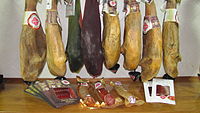Embutido
Embutido (Spanish and Brazilian Portuguese), enchido (European Portuguese) or embotit (Catalan) is a generic term for cured ground meat products. The dictionary of the Royal Spanish Academy defines it as "intestine stuffed with minced meat, mainly pork; intestine stuffed with diverse ingredients"[1][2] (the Spanish word comes from the verb "embutir", "to stuff"). The term often applies to any of the many varieties of cured, dry sausages found in the cuisines of Iberia and the former Spanish and Portuguese colonies.[3]
In Philippine cuisine, however, due to the fusion of Spanish and American cuisine in the islands, embutido (or embotido) refers to a type of meatloaf wrapped around slices of egg and sausage.[4]
Varieties
Specific varieties include, among many others (see list of sausages for the various countries):
- Chorizo/chouriço
- Sobrassada from the Balearic Islands
- Botifarra from Catalonia
- Butifarra Soledeña
- Fuet from Catalonia
- Salchichón
- Blood sausage (morcilla, morcela)
- Androlla from Galicia
- Linguiça/longaniza
- Alheira
- Farinheira
- Botillo/botelo, also known as chouriço de ossos
- Paio
- Chosco de Tineo from Asturias
-
Exposition of "embutidos"
-
Embutidos from Spain
See also
References
- ^ "embutido". Diccionario de la lengua española (in Spanish) (23 ed.). Real Academia Española. 2014.
- ^ "10 Tipos de embutidos y su composición" [10 types of embutidos and their composition]. Entrenosotros (in Spanish). Consum. n.d. Retrieved 26 December 2021. Illustrating use of "embutido" for all sorts of sausages, fresh and dried, including frankfurters
- ^ Viguer, Bélen Aguado (2016). Spain - Culture Smart!: The Essential Guide to Customs & Culture. Bravo Limited. p. 104. ISBN 9781857338393.
- ^ Lam, Francis (7 January 2015). "The Rich Tradition of Filipino Embutido". The New York Times Magazine. Retrieved 11 December 2018.




